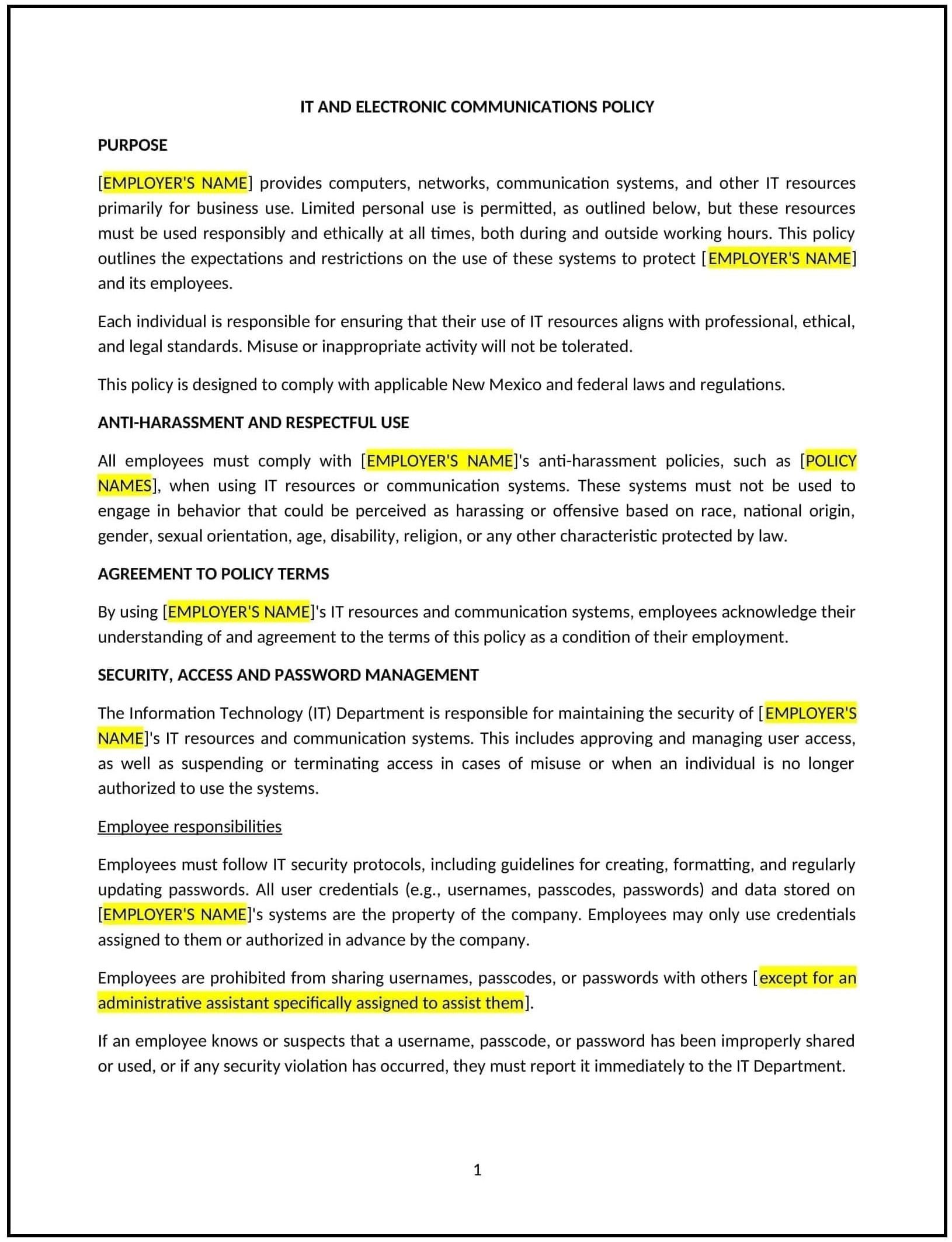IT and electronics communications policy (New Mexico): Free template
Got contracts to review? While you're here for policies, let Cobrief make contract review effortless—start your free review now.

Customize this template for free
IT and electronics communications policy (New Mexico)
This IT and electronics communications policy is designed to help New Mexico businesses manage and safeguard their electronic communications systems, including email, instant messaging, and internet use. The policy outlines guidelines for the appropriate use of these systems to protect both company data and employee privacy while promoting responsible and efficient use of technology.
By adopting this policy, New Mexico businesses can ensure that their communication systems are used in accordance with company goals, secure from misuse or legal risk, and in compliance with relevant laws.
How to use this IT and electronics communications policy (New Mexico)
- Define acceptable use: Clearly outline what constitutes acceptable and unacceptable use of company-owned electronic communication systems, such as email, internet browsing, social media, and instant messaging.
- Set guidelines for professional communication: Provide clear expectations regarding the tone, language, and content of professional communications, ensuring employees know how to represent the company responsibly when using electronic communication tools.
- Establish security measures: Outline the security protocols employees must follow, such as password protection, encryption of sensitive data, and using company-approved software to ensure communications are safe from unauthorized access or cyber threats.
- Implement monitoring procedures: Specify the company’s right to monitor electronic communications systems to ensure they are being used for business purposes and are compliant with company policies.
- Address New Mexico-specific considerations: Include any New Mexico-specific regulations regarding employee privacy, data protection, or electronic communications that may apply to the use of IT and electronics systems in the workplace.
Benefits of using this IT and electronics communications policy (New Mexico)
Implementing this policy provides New Mexico businesses with several advantages:
- Enhances security: By setting clear guidelines for how communication tools should be used, businesses can protect their networks, systems, and sensitive data from cyber threats, including hacking and phishing.
- Promotes professional conduct: The policy helps employees understand the importance of maintaining professionalism when communicating via electronic platforms, which can reduce misunderstandings and maintain a positive company image.
- Prevents misuse: Clear guidelines on acceptable use prevent employees from engaging in activities that could harm the company, such as excessive personal use of company systems, accessing inappropriate content, or violating company policies.
- Reduces legal risks: By establishing clear boundaries for communication practices, businesses reduce the risk of legal issues, such as harassment claims or breaches of confidentiality, and ensure compliance with state and federal regulations.
- Improves productivity: A well-defined policy encourages employees to use communication tools efficiently, focusing on work-related matters while avoiding distractions that can reduce productivity.
Tips for using this IT and electronics communications policy (New Mexico)
- Communicate the policy clearly: Ensure all employees are aware of the policy, particularly when onboarding new hires or providing refresher training. The policy should be accessible through the employee handbook or company intranet.
- Offer regular training: Conduct periodic training on the importance of secure, professional communication, and provide updates on any changes to the policy or technology used by the business.
- Implement robust security protocols: Ensure that employees are using company-approved software, strong passwords, and encryption for sensitive communications. Consider providing security tools such as virtual private networks (VPNs) or secure email services for employees who work remotely.
- Monitor usage appropriately: Implement a system for monitoring employee use of electronic communication tools in a way that respects employee privacy while ensuring compliance with company policies. Be transparent about the extent of monitoring.
- Review the policy regularly: Regularly review and update the policy to reflect changes in technology, employee feedback, New Mexico laws, or company needs.